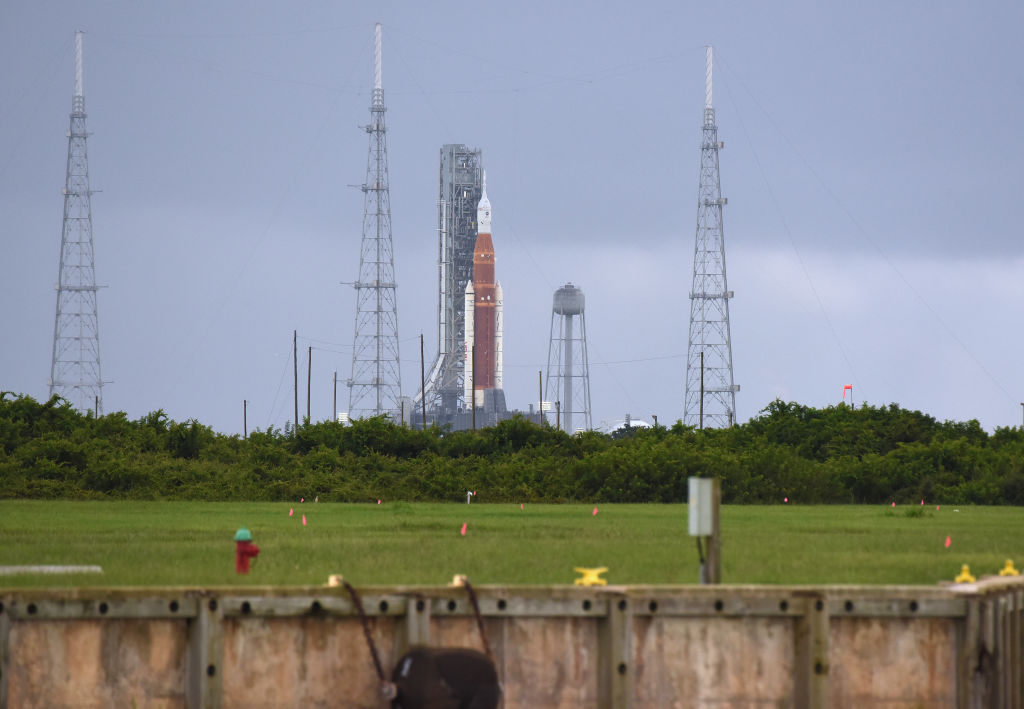
For the second time this week, NASA called off the launch of Artemis I on Saturday morning due to technical issues. The launch was originally planned for Aug. 29, but will now need to be rescheduled again due to a fuel leak.
Saturday’s launch was canceled when rocket operators sent a command to fill the rocket’s tank, and an alarm went off that there was a hydrogen leak. The launch team attempted several troubleshooting measures to repair the leak but was unable to. The rocket requires liquid hydrogen, so the leak will need to be sealed before its launch.
Before the first mission attempt, former NASA space shuttle program director, Wayne Hale, predicted uncertainty about the launch.
“I don’t want to be a Debbie downer but I rate the chances of #Artemis1 launch on Monday at about 50/50 not counting weather. It’s the first launch of a new complex rocket and there are likely still bugs to be worked out. Sorry if that makes folks upset but best to be realistic,” Hale tweeted on Aug. 27.
Artemis I is a moon orbiting mission that will serve as a test for if the new rocket technology will be able to safely accommodate astronauts in the following missions that NASA has planned to span the next several years to revitalize human exploration of the moon and Mars.
Launch attempts requiring several tries are not uncommon and generally err on the side of caution. Space reporter Kenneth Chang compared Artemis I to a 2009 NASA mission with the Endeavor rocket that was only successful on its sixth attempt.
Why was the first Artemis I launch postponed ?
The rocket used in Artemis I, called Space Launch System, is the most powerful rocket NASA has yet to develop, and is fueled by burning roughly three million liters of liquid hydrogen and oxygen in four large engines underneath the rocket.
The engines need to be chilled during the countdown to prevent a system shock from the launch and on Aug. 29 before the initial planned launch, a temperature reading indicated that one of the engines wasn’t cold enough. A fuel leak related to hydrogen appeared during the first launch attempt too, an issue that NASA experienced while practicing protocols for the rocket launch back in the spring.
Lightning strikes and stormy weather at the launch site in Cape Canaveral, Fla. appeared Saturday, but NASA officials said they didn’t think it would cause any interference. Ultimately it was the technical concerns with the engines that delayed the launch.
“We’ll go when it’s ready. We don’t go until then, especially now on a test flight because we’re going to stress this, and test it, and test that heat shield and make sure it’s right before we put four humans up on the top of it,” NASA administrator, Bill Nelson, said after the second Artemis I launch was canceled.
When is the launch expected to happen now?
Although NASA has the opportunity to try launching Artemis I again on Sept. 5 or Sept. 6, the agency doesn’t feel prepared for launch on one of these days. At a press conference on Saturday afternoon, Nelson and other NASA officials shared that the rocket’s team will continue working diligently to repair the leak and that a safe, full repair is their top priority.
“It was a much larger leak,” Nelson said. “The techniques that we used on Monday–for this magnitude of leak–were just not working in our favor.”
NASA will reassess the rocket’s condition and discuss a potential launch date next week, which will likely not be until October, at the earliest, when there is a window with optimal weather conditions.
Until the next launch attempt, the rocket will have to be rolled out of the launch pad, to the Vehicle Assembly Building (VAB), NASA’s engineering building where the rocket was assembled. The pad and VAB are both in the Kennedy Space Center complex.
Artemis I will not be carrying any passengers but will test the rocket’s safety for a future crew, in addition to carrying 10 small satellites to collect scientific and technical information for potential discoveries. NASA has expressed great optimism about the three-part Artemis program, named to complement the famous Apollo program.
“With #Artemis, @NASA will land the first woman and first person of color on the Moon. Take the next giant leap with us,” NASA has written on its Twitter profile.
More Must-Reads From TIME
- Dua Lipa Manifested All of This
- Exclusive: Google Workers Revolt Over $1.2 Billion Contract With Israel
- Stop Looking for Your Forever Home
- The Sympathizer Counters 50 Years of Hollywood Vietnam War Narratives
- The Bliss of Seeing the Eclipse From Cleveland
- Hormonal Birth Control Doesn’t Deserve Its Bad Reputation
- The Best TV Shows to Watch on Peacock
- Want Weekly Recs on What to Watch, Read, and More? Sign Up for Worth Your Time
Contact us at letters@time.com